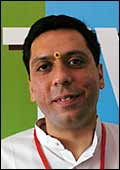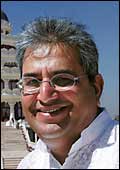|
Invites
for gabfests under the guise of seminars, discussion forums and
lectures are a part of any journalist's itinerary. Thus, it is with
a mixture of trepidation and curiosity that I approach a three-day
event hosted by The Art of Living Foundation (AOL) (from November
19-21, if you must know) on "Corporate Culture and Spirituality"
at AOL's international centre.
Located some 30 kilometres from the heart of
Bangalore on the Kanakapura Main Road, the ashram of Sri Sri Ravi
Shankar--the man behind AOL-is a verdant piece of greenery dominated
by a main convention centre called Vishalakshi Mantap. This, I discover,
is to be the venue for the meet.
Profit-or so I have always believed-is the
fundamental driver for any corporate. Reconciling profit motive
with spirituality seems a little hard to digest. It must be interesting
to see how some 350 denizens of the corporate world from India and
elsewhere try to make sense of it all, I chuckle to myself as I
make my way to the venue.
The first incongruous sight that greets me
is Nikhil Sen, the coo of biscuit giant Britannia (the company has
just announced that it has found a CEO, Vinita Bali, who is expected
to join in January), in a starched crisp white kurta-pyjama greeting
visitors with a 'Jai Gurudev'. Having seen a usually-in-a-suit Sen
in his corporate avatar, it is a pleasure to see him engage in some
grunt work like moving chairs and showing visitors around.
 |
 |
 |
 |
| Enlightened souls: (From
left to right) Ajay Bagga, CEO, Kotak Mutual Fund; Ruth Kouk,
Heiress, Kouk Group of companies; A.L. Rao, President (Telecom
Solutions) Wipro; and Nikhil Sen, COO, Britannia Industries |
| With Indian execs galore, a smattering
of international ones, even a Nobel Prize winner for variety,
this is as high-powered as it gets |
And it is not just Sen.
The gathering includes Ajay Bagga, CEO of Kotak
Mutual Fund (the youngest CEO in the Indian mutual fund industry,
I am told); Myron Scholes, Nobel Prize winner for Economics in 1997;
Anil Singhvi, CFO of Gujarat Ambuja Cements; Bill Elkus, Managing
Director of the $600-million (Rs 2,700-crore) Clearstone Ventures,
which has invested in 14 companies in India including Aceva, iPolicy
Networks, Mimosa Systems and SiNett; G. Mallikarjuna Rao, Chairman
of the Rs 2,500-crore GMR Group; A.L. Rao, President (Telecom Solutions),
Wipro; and Ruth Kouk, heiress to the Kouk Group of companies (which
includes the Shangri-La group of hotels and the South China Morning
Post newspaper). I meet more such worthies, but surely, you get
the picture: this is more high-powered than some corporate dos I
have attended (and I have done several) in my career.
| At the conclave, attendees did not appear
to have any trouble reconciling profit motive with spirituality,
with a rich heiress, a professor, and a finance professional
all stressing on the bottom line: spirituality "pays" |
The conclave begins with Sri Sri Ravi Shankar
outlining the objectives. There are two, I realise: to challenge
the concept that ethics and spirituality in business blunt competitive
edge; and to discuss whether an organisation whose foundation is
based on trust and ethical transactions can create wealth through
sustainable competitive advantage. Clearly, Gurudev is up to date
on his Porter.
Spiritualists often look down on business,
says Ravi Shankar, and businessmen frequently dismiss spirituality
as something that isn't really practical. "Spirituality is
the heart, business is the legs," he says. "Trust is the
breath of business, ethics its limbs, to uplift the spirit its goal.
An individual or a society is incomplete without both these aspects.
Business brings material comfort and spirituality brings mental
and emotional comfort. Spirituality brings ethics and fair practice
to business." The gathering is suitably impressed.
Dog Or Man?
Myron Scholes, an (economics) Nobel laureate
is on then, and argues that bringing a spiritual context to business
is all the more important because of the recent spate of corporate
scandals. "If you look at all great businesses, they are based
on two fundamental premises: Ethics and Trust (the capitals are
his, not mine). Business needs an anchor, and ethics as well as
trust plays that role."
|

|
|
Art of Living's Ravi Shankar: Touching
lives
|
Giving the example of a dog and a man, Scholes
(of the famous Black-Scholes model used to price stock options;
for the record, he is the first Nobel laureate I have met) says
companies had two choices: "Chase profits (like a dog) or follow
ethics and be a man. If you chase a dog it runs away; if you do
your task correctly, the dog chases you (rather, follows you)."
I am suitably impressed, just not totally convinced, something that
must come from years spent listening to glib CEOs. So, at the first
available opportunity, I corner Gurudev and ask him just where spirituality
belongs in a corporate context.
Focus On The Next Quarter Century Not Just
On The Next Quarter
The ever-smiling Ravi Shankar, Guruji or Gurudev
to followers, of which he has millions, smiles and says, "One
should not confuse spirituality with religion. Spirituality transcends
religion. There are certain fundamental immutable values across
cultures, religions and geographical boundaries. Trust and Ethics,
for instance, are about spirituality irrespective of the religion
one belongs to or even if one does not believe in religion. The
need of the hour is for businesses to realise that they can build
a long-term competitive advantage if they are, and are seen to be,
fair, transparent, ethical and trustworthy. These are not woolly
things, but can be measured and translate into profit." He's
got a point there. A conversation with Ruth Kouk, the heiress I
referred to earlier, convinces me more. Spirituality, she explains,
holds the key to success. "Money can buy you the services of
an individual," she says. "How do you inspire creativity,
research and invention? Enthusiasm cannot be bought." It definitely
can't; stifling notions that my editor has sent me here in lieu
of next year's increment and expected promotion, I listen on. "There
is no dichotomy between profit and ethics," says the next person
I speak to, which is Alexander Raikov, Professor (Artificial Intelligence),
Moscow Institute of Radio Electronics and Automation. "Companies
should not adopt short-sighted measures; the next quarter of a century
is as important as the next quarter." Bravo, is the best response
I can muster.
Increasing Productivity Spiritually
Meanwhile, Gurudev is on to the measurable
impact of spiritual well being that he mentioned. He points out
that after the Oil and Natural Gas Corporation's employees learnt
Sudarshan Kriya, a patented-by-AOL breathing exercise, its annual
health insurance bill came down by around Rs 1 crore. "If workers
are healthy and de-stressed, they can contribute better towards
the growth of an organisation."
Cynics die hard, and I decide to head for a
finance professional to air my last defence. Isn't it sufficient
that companies pay their dues (taxes) and conduct their business?
Aren't corporates to some extent discharging their responsibilities
towards society through Corporate Social Responsibility (CSR) already?
Why, the need to bring in spirituality? Ajay Bagga, CEO of Kotak
Mutual Fund, agrees with everything I say: "Yes, some organisations
are doing admirable work through CSR. What we are looking for is
that the very basis of doing business should be based on values
that we call spirituality." Bagga points out that socially
responsible mutual funds (these check, for instance, the environmental
policies of companies before they invest in them) have grown tremendously
over the past five years and that their returns are either equal
or better than those of their peers. Spirituality, he concludes,
"pays". Defeated, I return to my office, a wiser, spiritually-richer
hack.
|
